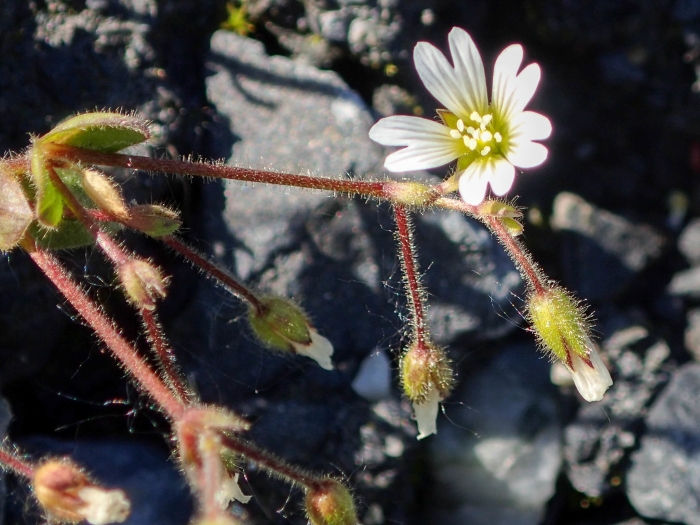Bering Chickweed
(Cerastium beeringianum)
Bering Chickweed (Cerastium beeringianum)
/
/

© naokitakebayashi
CC BY-SA 4.0
Image By:
© naokitakebayashi
Recorded By:
Copyright:
CC BY-SA 4.0
Copyright Notice:
Photo by: © naokitakebayashi | License Type: CC BY-SA 4.0 | License URL: http://creativecommons.org/licenses/by-sa/4.0/ | Uploader: naokitakebayashi | Publisher: iNaturalist |

























Estimated Native Range
Summary
Cerastium beeringianum, commonly known as Bering Chickweed, is a perennial herb that thrives in the harsh conditions of the Arctic tundra and alpine environments across North America and Asia. It typically forms low, dense mats reaching 2 to 8 inches in height, with a similar spread. The lance-shaped leaves are covered in fine hairs, giving the plant a silvery appearance. Bering Chickweed produces small, star-shaped white flowers from late spring to early summer, which are modest in size but can be quite numerous, creating a carpet of white over the green foliage.
This plant is valued for its exceptional cold hardiness and is often used in rock gardens or alpine collections where its low-growing habit and tolerance for poor, rocky soils are advantageous. It requires well-drained soil and full sun to part shade conditions. While it is not commonly found in general cultivation, it can be an interesting addition to gardens focusing on native or cold-tolerant species. Bering Chickweed is relatively low maintenance, but in more temperate climates, it may not thrive due to its preference for cooler temperatures.CC BY-SA 4.0
This plant is valued for its exceptional cold hardiness and is often used in rock gardens or alpine collections where its low-growing habit and tolerance for poor, rocky soils are advantageous. It requires well-drained soil and full sun to part shade conditions. While it is not commonly found in general cultivation, it can be an interesting addition to gardens focusing on native or cold-tolerant species. Bering Chickweed is relatively low maintenance, but in more temperate climates, it may not thrive due to its preference for cooler temperatures.CC BY-SA 4.0
Plant Description
- Plant Type: Herb
- Height: 0.5-1.2 feet
- Width: 0.5-1 feet
- Growth Rate: Moderate
- Flower Color: White
- Flowering Season: Spring, Summer
- Leaf Retention: Semi-deciduous
Growth Requirements
- Sun: Full Sun, Part Shade
- Water: Medium
- Drainage: Fast
Common Uses
Low Maintenance, Rock Garden
Natural Habitat
Arctic tundra and alpine environments across North America and Asia
Other Names
Common Names: Alaska Chickweed, Bering Mouse-Ear Chickweed, Chickweed, Bering Sea Chickweed, Alaska Mouse-ear
Scientific Names: , Cerastium beeringianum, Cerastium beeringianum var. beeringianum, Cerastium buffumii, Cerastium pilosum, Cerastium scammamiae,
GBIF Accepted Name: